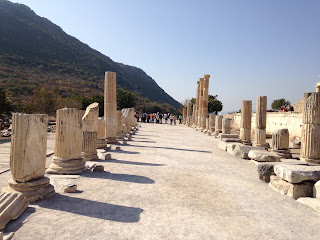The Things We Leave Behind
Read Acts 19:18-22.
It had been all about the son. Abraham and his wife had prayed and hoped and prayed some more, waiting for the promised son to arrive. After all, they knew that was part of the promise—to them, the biggest part. What good was land if there was no one to inherit it? What good were all these flocks and herds if there was no one to pass them on to? It was all about the son. And then, miraculously, the test came back positive, Sarah's body began to change, and nine months later, Isaac was born. They named him laughter because...well, when you're in the postpartum section of the hospital and Medicare is picking up the tab, what else could you do but laugh? Then came that awful day, the day Sarah may never have forgiven him for, when Abraham took Isaac to sacrifice him. God had asked him to, and so Abraham did. Thankfully, the story ends with God giving Abraham a ram to sacrifice instead, but Isaac is not said to return with Abraham to the camp right away. Perhaps he needed some time away from his father at this point. Was Abraham ever the same? It was all about the son, and he nearly lost him.
In Galilee, it was all about the nets. The nets represented security, or at least some measure of security. Sure, there weren't always fish in the nets when they rowed back to shore in the morning, but at least the nets were still there and they could try again tomorrow. For Simon and his partners in the fishing business, the nets were their livelihood. Their economic hope. The way they supported their families. How could this itinerant rabbi ask them to follow him and leave behind the nets? Seriously, how? Their world up to this point had been all about the nets. And yet, when all was said and done, the nets were left laying behind in the boats and a whole new life had begun.
For many in Ephesus, it had been all about the scrolls. The incantations on those scrolls were said to be magical. The sorcery was said to be real. And if you believed in it hard enough...well, it didn't seem to make any difference, but yet they believed. Then comes this itinerant preacher, an intellectual who lectured down at the Hall of Tyrannus, and he had convinced them that they should follow Jesus. The only problem? They couldn't hold onto their old lifestyle and follow faithfully. The scrolls, the sorcery, the old ways had to go. What to do with the scrolls? Do you give them away? Do you take them down to the used scroll shop and trade them in? None of that seemed right, so instead they gather them up and burn them in the public square. (Did they roast marshmallows as they did so?) As the flames rose higher, a good Methodist on the side began calculating how much the scrolls were worth, and they came up with the total 50,000 drachmas. The equivalent of 50,000 days' wages. Almost 137 years' worth of salary going up in flames. But it was no longer about the scrolls; it was about the savior.
And sometimes there are things we have to leave behind to follow and obey him.
 |
| Ephesus, 2014 |
In Galilee, it was all about the nets. The nets represented security, or at least some measure of security. Sure, there weren't always fish in the nets when they rowed back to shore in the morning, but at least the nets were still there and they could try again tomorrow. For Simon and his partners in the fishing business, the nets were their livelihood. Their economic hope. The way they supported their families. How could this itinerant rabbi ask them to follow him and leave behind the nets? Seriously, how? Their world up to this point had been all about the nets. And yet, when all was said and done, the nets were left laying behind in the boats and a whole new life had begun.
For many in Ephesus, it had been all about the scrolls. The incantations on those scrolls were said to be magical. The sorcery was said to be real. And if you believed in it hard enough...well, it didn't seem to make any difference, but yet they believed. Then comes this itinerant preacher, an intellectual who lectured down at the Hall of Tyrannus, and he had convinced them that they should follow Jesus. The only problem? They couldn't hold onto their old lifestyle and follow faithfully. The scrolls, the sorcery, the old ways had to go. What to do with the scrolls? Do you give them away? Do you take them down to the used scroll shop and trade them in? None of that seemed right, so instead they gather them up and burn them in the public square. (Did they roast marshmallows as they did so?) As the flames rose higher, a good Methodist on the side began calculating how much the scrolls were worth, and they came up with the total 50,000 drachmas. The equivalent of 50,000 days' wages. Almost 137 years' worth of salary going up in flames. But it was no longer about the scrolls; it was about the savior.
And sometimes there are things we have to leave behind to follow and obey him.


Comments
Post a Comment